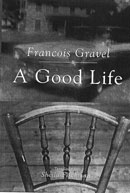
A Good Life
Francois Gravel
Cormorant Books
$29.95
paper
313pp
1-896951-34-1
As a boy Louis collects used crates from the port of Montreal and sells them as firewood. He learns that despite his timidity, he is a good salesman. He understands the mind of the customer and this talent, discovered not in relation to a passion but as an almost objective quality of his nature, leads him to a long and successful career in the furniture business.
In the warp and woof of destinies, Louis finds his place. But it’s not his place in the sense of something self-determined; it is a compromise in which duty overrides the tendencies that otherwise might beckon someone down the path of ‘self-fulfillment.’
The era of men who looked on work as a duty is one in which materialism and its comforts were accepted with childlike innocence. They buffed up their big American cars, they built houses in the suburbs. Dealing with a woman was another matter. When Louis goes on his honeymoon, he has to ask his brother how to ‘do it.’
There are some amusing characters in the orbit of Louis’s life. His sister Margot (“…fat and ugly. Puffed up everywhere except where she should have been…a walking horror show”) has a talent for attracting husbands who die off in the process of satisfying her whims. Another sister has a secret lover who turns out, to the disappointment of her suitors, to be Christ. The slow-witted brother Léo can’t read a city map, but he has a knack for catching fish and, by virtue perhaps of some related allure, he lands a beautiful wife.
These sketches imply a certain piety on the part of the author. Psychological probes are avoided. When Louis’ brother Édouard, a seminary dropout, becomes an alcoholic, we learn nothing about the underlying causes. The status quo and the collusion of interests that form society are never questioned. The Faustian will to plumb the depths of life is regarded as a kind of violence by people who might say, with Hamlet “there’s a divinity that shapes our ends, rough-hew them how we will.” This respect for the irreducible, made credible by Gravel’s generosity, limits his subject matter to “those everyday acts that we accumulate like beads on a string, little nothings that make up our lives.”
It is this very human core of Gravel’s novel that keeps it from delving into the richer, daemonic realms of experience. A Good Life suffers from a lack of thematic complexity. The aging, successful Louis walks around his suburban house, musing about peace and security. He loves his beer, his cottage, his La-Z-Boy. By the time we read about his creature comforts-“pour yourself a beer…go through the newspaper, nibble a few peanuts, light a cigarette…take another few peanuts”-we find the good life is nodding off into the banal. It is a measure of the author’s convictions that this banality has the glimmer of something dearly human. mRb






0 Comments